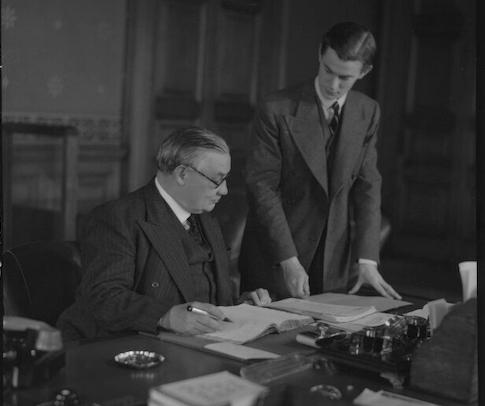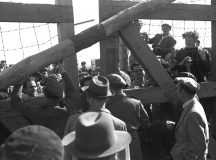In March 2021 Fathom published ‘The Rockiest of Starts: Anglo-Israeli Relations 1948-1950’ by Natan Aridan, editor of Israel Studies. Covering some similar ground, in May 2021 we published Ronnie Fraser’s essay ‘When Britain almost declared war on Israel’. In this note Aridan takes issue with some aspects of Fraser’s account of Britain’s actions in the months following the creation of Israel.
I welcome the opportunity to publish this response to Ronnie Fraser’s article ‘When Britain Almost Declared War on Israel’. I respectfully beg to differ on certain facts and conclusions which are in the main reached by Fraser with little reference to primary documents. Fraser contention that Britain almost declared war on Israel is not borne out by documents and records in archives in the UK, the US, and Israel. Britain did everything to avoid confrontation with Israel and at no stage was an ultimatum issued to Israel in December 1948, nor an Egyptian request to come to her defence under the Anglo-Egyptian Treaty of 1936. With much respect to Fraser’s previous research, I believe that caution is required. The dearth on academic research on this subject and many others, is partly due to the fact that much of the literature is written by those who have not thoroughly accessed the materials in archives, private collections, and library sources in Britain, the US and Israel, in addition to hundreds of interviews conducted. Furthermore, writing on Anglo-Israel relations necessitates a working knowledge of Hebrew or Arabic, without which, vital documents are ignored. This applies too to his analysis of Israel’s shooting down of five RAF planes on 7 January 1949. In this vein, there are those who argue that the US nearly declared war on Israel following Israel’s attack on the USS Liberty, an American intelligence ship under the dual control of the Defense Intelligence Agency/Central Intelligence Agency and the Sixth Fleet on 8 June 1967, the fourth day of the Six-Day War which was a grievous error, killing 34 members of the Liberty’s crew and wounding 171.[1]
THE ILLUSION OF THE BRITISH ULTIMATUM TO ISRAEL, 31 DECEMBER 1948
Within days of Israel’s Operation Horev on 22 December 1948 the IDF crossed the Egyptian frontier and rolled towards the Sinai Peninsula.[2] British intelligence was hindered in ascertaining the facts by Israel’s refusal to allow UN observers to visit the front.[3]
Minister of Defence, Arthur Alexander, seriously considered the use of force. Britain was also concerned about a possible embroilment with Israel on the Jordanian border. Although she was formally committed to assist Jordan in the event of ‘Israeli aggression’, Britain’s options were limited because public opinion would not tolerate a return of British troops to invade Palestine. Her efforts were restricting to curtailing Israel’s military advances through support of the Security Council efforts to reach a settlement.[4]
Britain was alleged to have issued an ultimatum to Israel at the end of December.[5] The only means an ultimatum could have been issued was through a third party whose interpretation did not ensure the final message replicated the original.
A significant question is whether in fact Britain issued an ultimatum to Israel. This is confounded by an agreed definition of the term ‘ultimatum’. International law defines an ultimatum as a final, definitive term submitted by one disputant nation to the other for immediate acceptance or rejection. Since refusal to accept the terms may lead to war or hostile measures, an ultimatum usually constitutes of a conditional declaration of war in written form and indicates how its non-acceptance will be regarded.
At 17:00 on 30 December, Bevin ordered Ambassador Sir Oliver Franks in Washington to urge the US Government ‘to act on the Jews as to make any military action by us on Egyptian territory unnecessary under our Treaty with Egypt’.[6] Franks met with Under-Secretary of State, Robert Lovett, and referred to ‘potential’ British action of arming the Arab countries, which did not include direct military intervention. Franks was not asked to forward the contents to Israel’s Provisional Government. The State Department sent a terse message to Ambassador James McDonald in Tel-Aviv warning that: ‘Unless Israeli forces withdraw from Egyptian territory, the British Government will be bound to take steps to fulfil their obligations under the Treaty of 1936 with Egypt.’ Israel was to be warned that the US would reconsider its application to the UN if it did not evacuate Egyptian territory.[7]
The telegram sent to Franks was later delivered as ‘an ultimatum’ by McDonald, the US Ambassador in Tel-Aviv who rushed to deliver it to Ben-Gurion, who was on vacation in Tiberias.[8] Suspicious of British motives, Ben-Gurion assumed that the harshness in tone could only have originated from Britain, whose antipathy towards Israel was patent. His diary entry clearly indicates that both he and McDonald believed that the document was a British ‘ultimatum’:
At noon, I travelled down to Tiberias. When I returned from ‘Hamei Tiveria’ [Hot water spa], I was informed that Moshe Sharett asked to have me call him. I was connected and then as far as I understood in code it turns out that J.M [James McDonald] received a note from his Government to inform us that the English have a contract with Egypt, and they’ll have to put the contract into action -that is, provide military assistance, if we continue to remain in Egyptian territory. When J.M. [James Mc Donald] heard I was in Tiberias he wanted to come down here, but Moshe prevented him. He [Sharett] asked whether to give orders immediately to return to our territory. I told him to confer with Yigal [Allon] on whether an immediate return will not interfere with the plans to conquer Gaza. At about eleven o’clock J.M. arrived with Knox and read us the written resume to this effect. I told J.M that it is true that our army, after our liberation of the Negev crossed the border out of strategic needs but it has already been ordered to return, and the reports his Government received to the effect that this was premeditated are incorrect…. As for the report from the British government, if it is obliged to act under these circumstances under the contract, it will be responsible for the Egyptian invasion. As for the second part of their statement, they present themselves as representatives of the UN, when in fact they are not, and about the decisions [of the Security Council] we are in contact with U.N. representatives, and we do not believe that England has a separate mandate to worry about carrying out U.N. decisions. We appreciate American friendship, which began even before the State was established, and there is no basis to worry that we will violate the peace. Peace is our primary vital interest both in the world and in the Near East, and we were not the ones who violated the peace in the country. Privately I said to J.M. that I am surprised at the tough tone. Is it necessary for a friendly power to approach a small and weak nation in such a tone? Knox promised to telegraph his answer tonight after he returns to Tel-Aviv (he’s staying here one more night). J.M. also expressed astonishment at the tone and he thinks that there must have been a lot of pressure on the President. Clearly, this note was dictated by England.[9]
Intended or not, McDonald’s ‘ultimatum’ in his résumé to Ben-Gurion had the desired effect. The attack on El-Arish was postponed and the IDF was ordered to withdraw from Egyptian soil by 2 January 1949. Without the ‘ultimatum’, the withdrawing Egyptian forces would easily have been defeated.
The illusion of the ultimatum was the invention of US diplomacy. Lovett included the threat of British intervention in the message sent to Israel, which now read: ‘unless Israeli forces withdraw the British Government will be [not ‘may be’] bound to take steps’. Ben-Gurion accepted the ultimatum at face value and decided not to call Britain’s bluff. The decision to discuss conditions for a ceasefire derived from neither UN nor US diplomatic pressure but fears of British military intervention. He cited the US warning of an ultimatum as the reason for the IDF withdrawal from the Sinai.[10]
Bevin’s biographer suggests that to save face, it was easier for him to appear to relent to British military pressure than to US verbal threats.[11] Whether Britain anticipated the US would re-interpret the telegram and present it as an ultimatum to Israel is unclear. Britain did, however, succeed in issuing a virtual ultimatum by proxy with the desired outcome. Israel achieved its military objectives and thus withdrew.[12]
If an ‘ultimatum’ had been issued, surely the Chiefs of General Staff would have been consulted. The ultimatum was not Bevin’s machination but initiated by President Truman himself.[13] A month earlier, the CIGS rejected military intervention because ‘it would not be easy to deploy forces in Palestine on the scale which would be necessary to ensure success’.[14] This was reiterated at their meeting on 30 December when they agreed that Britain could not intervene with superior air power alone.
Slim’s (head of the CIGS) recommendation of 3 January to present an ultimatum to the ‘Jews’ clearly suggests that they had not discussed an ultimatum four days earlier. The Defence Committee did, however, decide to reinforce the British contingent in Aqaba and send two battalions to the Suez Zone.[15]
Israel assumed that Britain had invoked the 1936 Treaty even though Britain’s representative in Haifa had conveyed to the ‘Jewish authorities’ that Britain had no wish to go to war with Israel.[16] Initially having requested British air support over the Sinai border, Egypt refused to invoke the Anglo-Egyptian Treaty’s clause, which referred to a ‘belligerent state’ since Britain did not recognise Israel. [17]
Foreign Minister Sharett found himself in the embarrassing position of guaranteeing the US that ‘No Israeli troops were on Egyptian territory’ when British intelligence confirmed that the IDF were at least 35 kilometres inside Egyptian territory.[18] Representatives in Cairo and Amman urged British military intervention to halt the Israeli advance otherwise there would be a ‘peace imposed by Israel.’ However, Bevin correctly deduced that Israel was not aiming at Egyptian territory, but to capture the Negev.[19]
Sharett replied to McDonald on 3 January that Israel had protected her interests following an Egyptian invasion, in breach of the UN Charter. He recalled that Britain preferred to condemn Israel’s actions, while supporting and abetted Arab invading armies. He made a distinction between Britain and the US, ‘The Government of Israel must nevertheless register its profound resentment at the attitude of the Government of the United Kingdom as transmitted without comment by the United States Government.’[20] The same day Acting President Weizmann sent a letter to President Truman, reassuring him of Israel’s peaceful intentions.[21]
THE DOWNING OF THE FIVE RAF PLANES, 7 JANUARY 1949
A tragic and ironic development marking the conclusion to Arab-Israeli hostilities was the armed confrontation between Israel and Britain on 7 January 1949 after Israel and Egypt had agreed to comply with the UN ceasefire and enter negotiations.[22] Britain suffered the most humiliating military loss since World War II when the nascent Israeli air force patrolling the border with Egypt intercepted British Spitfires and engaged them in a series of dogfights. They shot down five RAF aircraft reconnaissance sent to ascertain whether the IDF was still on Egyptian territory, over the Sinai, four in air combat and one by ground fire. Two British pilots were killed, one succeeded in making his way back to Egyptian lines, and two were taken prisoners.
The day was particularly tense as the belligerents made a last concentrated effort to reinforce their positions before the ceasefire. Israel anticipated British military action. Two hours before the air clash, British forces landed at Aqaba in response to Jordan’s request for aid.
Britain refused to cancel the flights until she could ascertain confirmation of the IDF’s withdrawal from the Sinai following the cease-fire. Although the ceasefire was to come into effect at 14:00, Alexander pressed Attlee to operate the flights to detect the strength and composition of Israeli forces since UN observers were unable to visit the area.[23] Unaware that the UN had in fact made no such request, the Cabinet approved to continue the flights.[24] The flights disturbed Attlee who demanded the Ministry of Defence report directly to him.[25] He disliked the term ‘reconnaissance flights’ since as part of operation ‘Clatter’ they were in accordance with the Anglo-Egyptian treaty. Alexander confirmed their importance in thwarting Israeli ‘aggression.’[26]
Bevin did not object to the Ministry of Defence’s tactics vis-à-vis the incursion into the Sinai as part of the Israeli strategy to negotiate with Jordan.[27] He agreed that political considerations should not override military operations. Although he did not oppose the flights, he feared that Britain would be accused of breaking the truce.
The incident was not without precedent. Three weeks earlier, Israel downed an RAF plane on a reconnaissance flight over the northern Negev.[28] Britain’s disregard for Israel’s sovereignty caused Israel to treat the presence of all British planes as hostile.
Israel viewed British military flights between Jordan and Egypt over her airspace as a flagrant disregard of international law. Britain argued the flights were a departure in her policy because of Israel’s aggression.
Although there were guns in the turrets they were not loaded; however, how were the Israeli pilots to know that? British pilots received oral instructions not to open or return fire because Israel, Britain and Egypt flew Spitfires, making identification difficult.[29] Although the demarcation of the international border was incomplete, there is irrefutable evidence that RAF planes entered Israeli airspace. One of the British pilots admitted that his plane was shot down over ‘Palestine’. Ben-Gurion’s account is ambiguous. He instructed Yigal Allon, IDF Southern Commander to return to Israel the debris of the crashed planes: ‘I ordered some of the planes moved into Israeli territory boundaries, for obvious reasons … a fabulous day. Did the war end today?’[30]
Britain manipulated reports of the removal of the wreckage as proof that Israel had downed the planes outside its airspace. However, ‘the nature of the British reaction was not related to the question of where the planes had crashed, but to the new political processes now commencing’. British troops stationed in the Middle East were placed on full alert, all leave was cancelled and British citizens were advised to leave Israel.[31]
On 8 January, the CIGS decided ‘to act tough with Israel’ by announcing two directives, which left British pilots perplexed.[32] The first order was to regard every Israeli aircraft infiltrating Jordanian or Egyptian airspace as an enemy plane and to shoot it down. The second directed that ‘RAF activity close to Israel’s border be halted forthwith’.[33]
Bevin believed that the joint US-British pressure, which forced Israel to withdraw from the Sinai, would help restore Arab faith in the West. However, he underestimated the degree of US anger over the incident and Truman’s resolve to press Britain to moderate its policy. He also made no secret of his view that Britain had backed the wrong horse.[34]
Israel surmised that the US had advised Britain to close the incident and to abstain from hindering Israeli-Egyptian negotiations.[35] Israel launched a diplomatic offensive at the UN on 12 January when Eban explained that Britain’s menacing policy was responsible for the clashes. He accused Britain of repudiating the 29 May 1948 United Nations General Assembly Resolution calling on all governments and authorities to undertake not to introduce fighting personnel into Palestine and surrounding countries during the cease-fire. Britain’s moves could only be interpreted as designed to threaten Israel’s position in the southern Negev.
Initially, the British press blamed Israeli aggression: ‘Jews shoot down 5 RAF planes’, and ‘Bevin asks empire aid to stop Israel Reds’. However, as the humiliating facts became known, disapproval mounted at the government’s handling of the incident.[36]
REFERENCES
[1] http://www.thelibertyincident.com/documents.html
[2] Operation Horev 22 December 1948-January 1949; Elhanan Orren, Operation Horev (Tel-Aviv, 1982), 7 [Hebrew], Nethanel Lorch, One Long War: Arab Versus Jew Since 1920 (Tel-Aviv, 1976) [Hebrew].
[3] UNNA (United Kingdom National Archives) FO 371/75045 1016/167, Burrows, FO Minute, 15 January; CAB 128/15, 3 (49) 17 January 1949.
[4] CM 128 (48) 71, 12 November; COS (ME) 308, 31 Dec 1948.
[5] Ilan Pappé, Britain and the Arab-Israel Conflict (Oxford, 1985); The British Empire in the Middle East, 1945-1951 (Oxford, 1984).
[6] FO 371/68692, 11666, 30 December 1948.
[7] FRUS (Foreign Relations of the United States), 1948, V, 31 December 1690, 1701–5.
[8] Lorch, 46–8; J. McDonald, My Mission in Israel, 1948–1951 (New York, 1951),
107-14.
[9] BGA, (Ben-Gurion Archives) BGD (Ben-Gurion Diary), 31 December 1948 [Hebrew].
[10] ISA, 377/16, 2318/5, 3 January 1949. BGA, BGD, 31 December 1948; M. Bar Zohar, Ben-Gurion (Tel-Aviv, 1976), 859-60 [Hebrew]; ISA (Israel State Archives), 2412/26, 3 January. Linton informed Sharett that Lewis Jones of the State Department had told him that: ‘If we crossed frontier, it would be a serious matter, and quoted from copy of the Anglo-Egyptian treaty.’ ISA, Provisional Council minutes, 16, 5 January 1949; Orren, Operation Horev, 7.
[11] Alan Bullock, Ernest Bevin – Foreign Secretary, 1945-1951 (Oxford, 1985), 650.
[12] FRUS, 1948, VI, 30 December 1701–2.
[13] FO 371/75045 1016/167, 15 January; CAB 128/15, CAB 3 (49) 17 January 1949; FRUS, 1948, V, 30 December, 171–2.
[14] CAB 128 CM 128 (48) 71, 12 November 1948.
[15] FO 371/75045 1016/367, 3 January; CAB 21/1922 DO (49), 1 January 3, 1949; 30 December 1948; AIR 8/1791; Alec Kirkbride, From the Wings: Amman Memoirs, 1947–1951 (London, 1976), 90; FO 141/142, 31 December 1948; 2 January; 75334 1016/454, 10 January; 1016/156, 4 January; 75336.
[16] FO 753341016/1273, 17 January 1949; IDF, Toldot, 349–55; BGA, BGD, 30 December 1948; FO 371/75334 1016/360, 14 January; ISA, 38/12, 4 January; ISA, 36/12, 3 January 1949; Harold Wilson, The Chariot of Israel (London, 1980), 232. The Protracted Recognition of Israel, 1949–50, 25
[17] FO 371/75380 1091/362, Middle East HQ to Air Ministry, 2 January 1949.
[18] FO 371/75380 1091/362, 2 January 1949.
[19] FO 141/142, BMEO to FO, 30 December; 816/142, BMEO to Amman, 31 December 1948; Beirut to Amman, 2 January; 75334 1016/454, Campbell to FO, 10 January; 1016/156, Troutbeck to Bevin, 4 January; 75336 1016/1273, Sargent, minute, 17 January 1949; The History of the Israel Air Force during the War of Independence, ed., Avi Cohen (Tel-Aviv, 2004), 349-55 [Hebrew]; David Ben-Gurion, The Renewed Stated State of Israel (Tel-Aviv, 1951), 335 [Hebrew].
[20] ISA. 2414/26, Sharett to McDonald, 3 January 1949.
[21] ISA, 2414/26, 3 January 1949.
[22] Brian Cull, Shlomo Aloni, David Nicolle, Spitfires Over Israel (London, 1993); Zeev Tzahor, “The 1949 Air Clash between the Israeli Air Force and the RAF,” Journal of Contemporary History 28.1(1993): 75-101; Yitzchak Steigman, From the War of Independence to Kadesh: The IAF, 1949–1956 (Tel-Aviv, 1990) [Hebrew]; Gordon Levett, The Shabbos Goy (Tel-Aviv,1989); Ezer Weizman, On Eagles Wings (Tel-Aviv, 1976); Eliezer Cohen and Zvi Lavi, The Sky is not the Limit (Jerusalem, 1990) [Hebrew]; A. Bateman, “Unholy Land”, Air Clues, April 1987, 154–6.
[23] FO 371/75339 1016/154, Attlee to Bevin, 30 December 1948; 1016/297, Alexander to Attlee, 1 January 1949.
[24] FO 371/75402, Beith, FO minute, 3 February; FO to Alexander, 10 January 1949.
[25] FO 371/75399 1016/154, 30 December 1948; 75247, 75388, 75339, 75400-2.
[26] FO 371/75339 1016/154, Attlee to Bevin, 30 December 1948; CAB 128/31 CM 3 (49), January 17; CAB 21/1922 DO (49), 1 and 3 January 1949.
[27] FO 371/75399 1016/154, 30 Dec 1948; 1016/297, 1 January; 128/31 CM 3 (49), January 17; CAB 21/1922 DO (49), 1, 3 January 1949; FO 371/75402 1223, 3 February; 10 Jan. See also 75247, 75339, 75388, 75400–2; FO 371/75334 1016/338, 11 January 1949; Marcus Sieff, Don’t Ask the Price (London, 1982), 189-90.
[28] AFHA Intelligence Report 19, 25 November; Intelligence Report, Southern Front HQ, 25 Nov 1948; AIR 27/2769, Log of Squadron 213 stationed in Egypt, 8–9 January 1949; Daily Report, 57, 9 January, see also 1–10 January; Weizman, On Eagles Wings, 72–7.; ISA, Provisional Council minutes, 16, 9 January 1949; Davar and Haaretz, 22 November 1948; CAB 21/1922, DO (49), 1, 3 January 1949; Hansard, 459, 1388.
[29] FO 371/75247 1221, 13 January 1949.
[30] BGA, BGD: 7 January 1949.Weizman wrote that he shot down the planes because he was feeling ‘blue’ about missing out on the glory of that day: ‘Here the war was over here it was breathing its last breath … and I was left out of the celebration [and] went to seek his prey’, Toldot, 362.
[31] CAB 128/1, CM 3 (49), 17 January; FO 371/75400, 1223, 11 January 1949.
[32] DEFE 4/19 COS (49) 5, 8 January 1949.
[33] AIR 27/2769, Log of Squadron 213 stationed in Egypt, 8–9 January 1949.
[34] FRUS, 1949, VI, 9 Jan, 594–5, J. McDonald, My Mission in Israel, 107–14. On January 10, Truman summoned Franks to the White House and told him: ‘I don’t like what you people are doing … your planes have no business over the battle area in Palestine’. Lovett told Franks that: ‘It was clear indeed as had been proved by recent events, that the State of Israel would be the most dynamic, efficient vigorous government in the Near East in the future’, FO 371/75334 1016/614, 13 January; 1016/615, 17 January; BGA, BGD, 13 January; FRUS, 1949, VI, 9 Jan, 633, 645; Dean Acheson, Present at the Creation: My Years in the State Department (New York, 1969), 342. BGA, BGD, 9 January; ISA, 2318/5, 11 January 1949; FO 371/75367 1051/350, 7 January; 75334 1016/614, 13 January 1949.
[35]. ISA, Provisional Council minutes, 16, 11 January. This was also the recommendation of Rafael at the UN, ISA, 2180/31, 10 January; 2412/26, 11 January; 2412/28, 18 January 1949.
[36] Manchester Evening News, 8 January; Sunday People, 9 January 1949. Except for the Observer, all the Sunday papers blamed Israel; Manchester Guardian, 10 January; The Times, 11 January. See L.S. Amery’s letter the same day; The Times, 13 January; New Statesman, 8, 15 January; Economist, 15 January 1949.



































